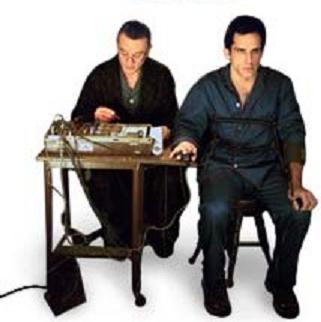CRIME: fMRI Brain scans: Far better than the polygraph
 |
| From the trailer for the movie, "Meet the Parents", starring Robert De Niro and Ben Stiller. |
fMRI brain scans are 99 percent accurate in identifying
when a person is lying in response to questions.
If conventional lie detector machines, polygraphs, have been endlessly debunked and shown not to provide admissible nor even valid evidence, then the 21st Century tool of choice for reading the minds of witnesses and suspected criminals may be the brain scanner. More specifically, the kind of functional magnetic resonance imaging (fMRI) that can seemingly probe our inner selves and reveal the flow of blood in the different regions of the brain that light up when we lie.
 |
| Suggested reading click on image |
Researchers point out that the use of fMRI in a legal context "is potentially groundbreaking," they note that it might be possible for witness testimony to be validated by fMRI. It could even be used to detect juror bias in a trial.
"The assistance to the defense that could be provided by neuroscientific evidence could further balance the equality of arms in an adversarial justice system," the team suggests. "There [now] needs to be consideration of how the results of neuroscientific analysis will be presented to the jury.
Science is moving at a great speed and these techniques are likely to become more refined and advanced in the future. As such, due regard must be paid to both the due process rights of defendants and the impact of this evidence on the adversarial notion of our criminal justice system.
"Indeed, for the sake of our adversarial criminal justice system, it is important for the law to keep up," the team concludes.
* * * * *
Story Source: Materials provided by Inderscience. Edward Johnston, Daniel Jasinski. Neuroscientific evidence: a criminal justice dream, or an adversarial nightmare? International Journal of Liability and Scientific Enquiry, 2013

Comments
Post a Comment